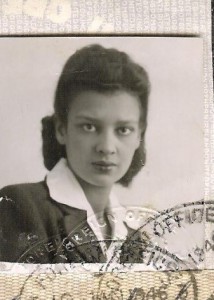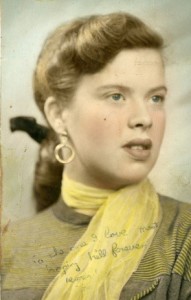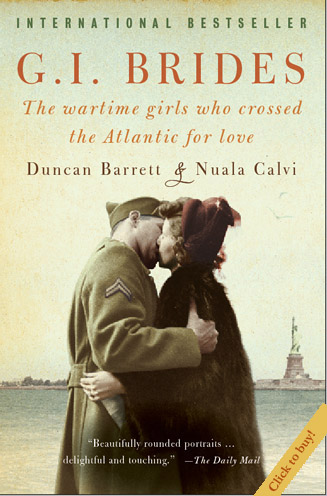The Welsh War Brides of Tiger Bay
Posted By GI Brides ~ 28th January 2014
In this guest blog, Dr. Valerie Hill-Jackson shares some of the stories she discovered in the course of researching her documentary Tiger Brides: Memories of Love and War from the GI Brides of Tiger Bay
When I married my husband, Bowen Keiffer Jackson, Jr. (Special Agent, FBI, retired), he knew very little about where his mother Patricia Ann Ismail was from or that she was a Welsh War Bride of mixed ethnicity – half Somali and half Welsh. He does recall sweet childhood memories in which, in her gentle British accent, she would request ‘a cup of tea’ most evenings. Bowen Jr. and I went to Wales in 2008 to visit Patti’s home to find out more about her background, wartime experiences and romance. I was driven to uncover the hidden history of this beautiful war-time bride from Sophia Street in Tiger Bay.
Tiger Bay is a half square mile, tight-knit, inclusive, multi-cultural community in Cardiff, Wales. It is internationally renowned as one of the most diverse communities in the United Kingdom; settled in the late nineteenth century by sailors from around the world, who married White women from the British Empire. As a family we went back in 2013 with our teenage daughter, and for several months I interviewed Tiger Bay residents, GI brides and their children, local historians, World War II experts and anyone else who could help me piece together the story of wartime Black GIs and their brides.
Although British marriages to white GIs are well documented, history has ignored those of black GIs, particularly their marriages to black or multi-ethnic British women. Tiger Bay war brides travelled half way around the world for love. These seventy to one hundred Tiger Bay women may be one of the highest concentrations of war brides (per capita) from any geographic region to come out of the World War II tragedy. This is truly a cultural phenomenon!
It was not all smooth sailing for the brides and would-be brides as they waved goodbye to their GI husbands and partners after the war, some as late as the 1950s, and faced the prospect of leaving their families and travelling alone to an unknown new home in America. In many cases their parents’ own life stories will have given them courage – fathers from far-flung lands who had joined their first ship to Britain as teenagers and Irish or Welsh mothers who had suffered prejudice for marrying men of a different colour or creed, but found sanctuary and acceptance in Tiger Bay.
It is remarkable that any of the estimated 70-plus Tiger Bay marriages ever developed at all because the US Army did not leave its segregationist policies at home when black GIs were brought to Britain. As well as being assigned to separate bases from their white fellow soldiers, Black GIs were banned from visiting Tiger Bay. But love found a way and they developed methods of dodging the patrolling Military Police – usually with the help of local Tiger Bay residents – so they could visit the girls for whom they had fallen.
While many white British war brides were saddled with homesickness and embittered in-laws in a new country, the Tiber Bay war brides wrestled with the added burden of racism and discrimination. These women landed in America at the height of inequitable Jim Crow laws. Such practices as being forced to use separate drinking fountains, barred from schools and theatres, terrorized by the unchecked lynchings of black men, refused residence in ‘white’ neighbourhoods, denied decent jobs and a living wage, and blocked from access to the benefits of the GI Bill – were the daily lived realities of these Welsh beauties and their black veterans.
Having experienced the warmth and strength of the original Tiger Bay residents still living in what is now called Butetown, we grew to understand how that community gave Patti the determination to fight the racism and segregation she found in America. Patti and Bowen Keiffer Jackson Sr., a Technician Fifth Grade soldier in the US Army, were wed at the Cardiff Registry in April 1945. Bowen Sr. went to Belgium in late 1945 and they were reunited, after Patti’s long trip on the Queen Mary, in May 1946.
Patti married into a Civil Rights dynasty; she was the daughter-in-law of Dr Lillie Mae Carroll Jackson – the mother of the Civil Rights Movement and the President of the Baltimore Branch of the NAACP. Patti played a leading role in the Civil Rights Movement and the NAACP, paving the way for many of the freedoms people enjoy today. Patti and Bowen Sr. had four children together and eventually made their way to Pasadena, California. The pair divorced in the early 1960s and Patti remarried another black American veteran. Patti is survived by her four children, nine grandchildren and ten great-grandchildren.
Now Bowen and I can share Patti’s legacy with our children and grandchildren.
Another war bride, Margaret Norman Lassiter, married in the early 1950s when the second wave of Black GIs descended on Tiger Bay. By this time segregation in America’s army had ended and black soldiers were now stationed on Army, and Air Force bases around parts of the United Kingdom. When the word was out that Tiger Bay was filled with beautiful women of mixed ethnicity, it became a magnet for Black GIs and they descended on this community. Margaret’s husband John found unique ways to woo her through romantic gestures with candy bars, flowers, and clothes from America. John would also find ways to visit Margaret by driving military equipment from one US base in England to another.
But Margaret was slow to succumb to John’s advances. She found the guys who could dance, especially those from Philadelphia, more exciting. Eventually they both became smitten and were married in a simple service in Cardiff, but both families were not pleased by their union. Eventually, John was sent back to the United States, without his new bride, when his orders were finished. When John arrived home in Connecticut, his father expressed his fear that he and Margaret might be treated poorly by other Americans because Margaret, of mixed ethnicity, ‘looked’ white. Marriages between Whites and Blacks in the US were not legal during this time, and many whites could make life difficult for them and the extended family. John’s father convinced him not to send for Margaret and their son.
When Margaret received the telegram from John lamenting, ‘no hope, no job, it’s all a big mistake,’ that Tiger Bay spirit erupted and she scraped up some money from a friend, and her Cape Verdean grandfather, and made her way to Ellis Island with just a few dollars in her pocket and a baby in tow. They had a beautiful life of struggle, love and four children together. John passed away in early 2013 and Margaret’s eyes still well as she reminisces about him; she does not regret one day with John!
Patti and Margaret’s experiences, and the untold stories of four other Welsh girls of mixed ethnicity from Tiger Bay, come under the spotlight in Dr Hill-Jackson’s new documentary Tiger Brides: Memories of Love and War from the GI Brides of Tiger Bay and in her forthcoming book, tentatively entitled Invisible: The Lost Tribe of Welsh War Brides from Tiger Bay (coming in 2015).
Dr Hill-Jackson is keen to hear from anyone with photographs, letters, diaries, memories or mementos relating to the GI brides from Tiger Bay or black soldiers stationed in Wales; specifically those who served in Cardiff or nearby in England. You can email her on dr.v.jackson@gmail.com.
Check out the trailer of the Tiger Brides documentary here (you have to input the password 5minpromo to view it).





I have noticed you don’t monetize your blog, don’t waste your traffic, you can earn extra bucks every month because
you’ve got high quality content. If you want to know how to make extra bucks, search for: Ercannou’s essential adsense alternative